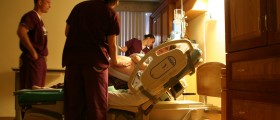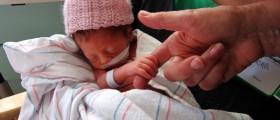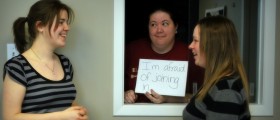
Treatment for Down Syndrome
Presently there is no cure for Down syndrome. The primary aim of treatment is to ease the signs and symptoms of the disorder and repress any of the medical problems that usually follow Down syndrome. In order to prevent the inherit health complications regular screening tests and monitoring of the progress of illnesses plays a substantial role in treatment. Depending on the severity of Down syndrome some individuals require little medical attention and go on to live relatively healthy lives. Others depend on medications and occasional surgeries and need long term medical assistance. Aside from the medical type of treatment, physical, occupational, and speech therapy is available to help deal with the cognitive and motor impairment. It is unknown why Down syndrome occurs in the first place so all that can be done at this point is treat the consequences of the disorder.Related Medical Problems
There is a wide range of medical problems that affect Down syndrome patients. For instance, heart anomalies are present in almost 50 percent of the cases. Congenital heart disease, primarily the septal defect, is the most common type of the problem. Septal defect refers to a hole in the wall of one of the chambers of the heart. The result is a build up of blood which puts a strain on the organ and hinders its functioning. The septal defect can be relatively mild and treatable by minor procedures. The more serious cases require open heart surgery. In both instances patients need to take medications to ease the symptoms. As heart problems are a serious concern regular checkups are essential, starting right at birth. Down syndrome persons are also fairly prone to infections as their immune systems are weakened. Many suffer from hearing problems brought on by middle ear deformity. Excess fluid builds up in the middle ear, resulting in the sounds being muffled and distorted. Hearing aids usually help, but surgery is often required as the more long term kind of solution. Down syndrome individuals are also prone to tooth decay. The bacteria in the mouth gradually break down the teeth and cause various gum problems. Tooth decay may result from the fact that the patients have limited motor skills and thus find it difficult to brush properly. It has also been established that the level of saliva is lower in Down syndrome persons allowing the bacteria to flourish. Mechanical tooth brushes are recommended and so is assistance from family members when brushing teeth. Aside from the physical health issues, cognitive impairment to a varying degree is also to be expected. It is difficult to estimate the degree of mental retardation at birth, but experts agree that with early interventions Down syndrome children can acquire the necessary skills for everyday life, and with proper long term care can keep learning new things and realizing their full cognitive potential. Lower IQ is usually observed, but it should be noted that their social and language skills are on average better than those of persons who are on the same intellectual level but affected by other debilitating disorders. Down syndrome children do reach developmental milestones, but just take longer to get there. Therefore, their development should not be compared to that of the children from the general population. Occupational therapy is a proven method for helping Down syndrome persons reach their full capacity.Counseling and Support
There are numerous types of counseling and support groups available for caregivers and family members as well as for the Down syndrome persons. Participants agree that empathy and understanding found at such meetings is highly beneficial. Also, support from the local hospitals including doctors, nurses, and other health care professionals helps with the health issues. Learning as much as possible about the disorder and its accompanying complications can assist both the caregivers and the affected person. Social workers and councilors are available in most communities to those who want to express their concerns. In support group meetings, individuals with similar problems get together and share information about coping with the condition. Support groups are available both in person and online.Translocation Down Syndrome
Down syndrome is the type of genetic disorder characterized by additional genetic material being passed down to the offspring at conception. In most cases one whole extra chromosome 21 is inherited, and in other instances only parts of the material from the additional chromosome 21 are passed on. Translocation Down syndrome refers to the attachment of the additional genetic material to other chromosomes, usually 13, 15 or 22. It is also possible for the two chromosomes 21 to be attached to each other. Only a handful of Down syndrome patients are affected by translocation. Individuals with translocations look very similar to other Down syndrome persons and exhibit the same mental, physical, and health problems. The parents of the translocation persons are usually just the carriers of the disorder who never develop any symptoms.
















Your thoughts on this
Loading...